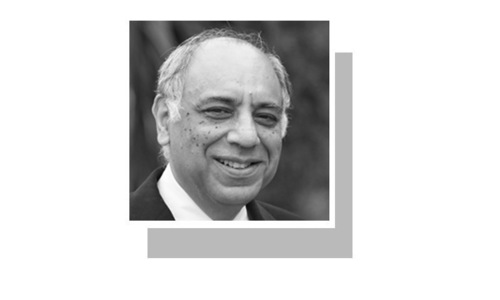Information and Broadcasting Minister Fawad Chaudhry said on Thursday that extremism in Pakistan was not rooted in madressahs but schools and colleges, where teachers were hired during the 80s and 90s as part of a plot to "basically teach extremism".
Addressing a consultative conference on terrorism in Islamabad, Chaudhry said that the students of "ordinary schools and colleges" had been involved in notable incidents of extremism in Pakistan and not of madressahs.
Because, he went on, "you closed their (school and college students') minds. If you cultivate a society where an opposing view is immediately declared kufr (heresy) ... how can you present an opposing view?"
"And if no opposing views are tolerated, how will you bring a soft change [in society]?" he asked rhetorically.
In this regard, Chaudhry gave the example of late Jamiat Ulema-i-Islam-Fazl leader and religious scholar Maulana Hassan Jan, whom he said was murdered for giving a fatwa that declared suicide attacks forbidden in Islam. Similarly, he added, for such reasons many other scholars were unable to come to Pakistan.
"Likewise, when a matter is taken up by the Council of Islamic Ideology and I ask that the other side's perspective also be presented, they ask back, 'do you want us killed?'" the minister said.
He claimed that scholars in Pakistan were afraid of speaking up, adding that society itself had to rectify the narrative of extremism.
The threat within
The minister recalled that at the time of creation of Pakistan, "it was the land of Sufis [and] home to [their] tombs."
He continued that around 300 years ago, there was no religious extremism in today's Khyber Pakhtunkhwa, Punjab and other areas in the country.
"Religious extremism was seen more in regions that are in India now. Areas over here (Pakistan) never had religious extremism to the extent [seen today]," he said, regretting that "Pakistan faces a grave danger today."
"We don't have any potential threat from India. We have the sixth largest army in the world, we are an atomic power, and India cannot compete with us," he continued. "We face no danger from America. We face no danger from Europe. The biggest danger we face [today] is from within [Pakistan]."
Read: Ignoring the seeds of extremism
The minister acknowledged that remedial steps taken to counter extremism in the country were not sufficient, adding that neither the government nor the state was prepared enough to deal with the problem.
Giving the recent example of the government's dealings with the Tehreek-i-Labbaik Pakistan, the minister said: "We [all] saw how the government had to go on the back foot."
And this was indicative of a ticking bomb, he remarked.
'Extremism not related to religion'
Speaking about extremism in the context of Islam, he questioned: "Whoever has even little understanding of Islam and is aware of the way Holy Prophet Muhammad (PBUH) spent his life, how could he adopt extremism?"
So the issue of extremism was not related to the teachings of Islam, he explained, adding that it was neither related to any other religion.
"The problem is with those who interpret religious injunctions," the minister commented.
The state's role
Pointing out another "dilemma" pertaining to the issue of extremism, Chaudhry lamented that "we have destroyed the policing and law enforcement system developed by the British here."
"And we didn't even come up with a replacement [for the system]."
Lamenting that the institutions of "numberdar, chowkidar and thanedar" had been destroyed, he elaborated that "opposing views will not be given space until people's lives are safeguarded, and their lives cannot be protected until the law is enforced."
"[The] state should have only one business, and that business is the enforcement of law. If a state is unable to enforce the law, its existence is questioned, as in this scenario, it gradually moves towards civil war."
In this regard, he also explained the difference between "enforcing a different point of view and presenting a different point of view".
A society may have different views and it is the state's job to ensure that no group within it is allowed to use violence to impose its view, he said.
"This will ensure that there is diversity of views within a society and keep extremism at bay."
He added, however, that "if the state weakens and violent groups gain strength, there lies a problem."
Hence, Chaudhry said, soft change in society was not possible without establishing the writ of the state and enforcing the law.
"If you want to bring a soft change, you (state) will have to be hard."













































